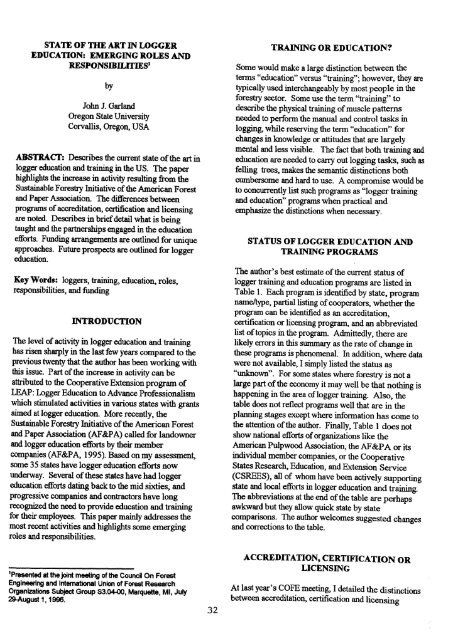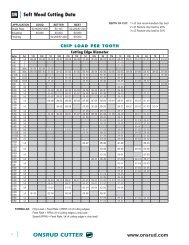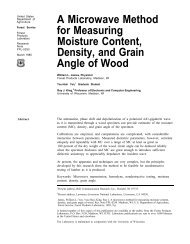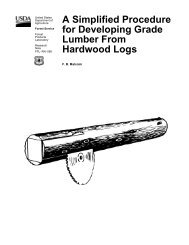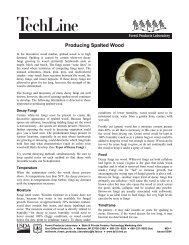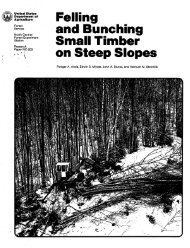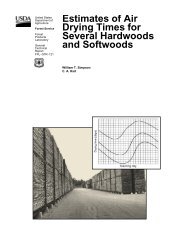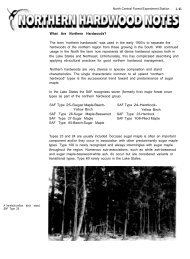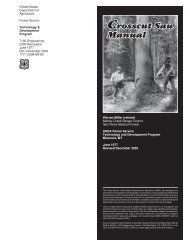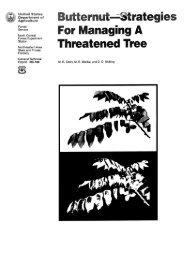Planning and implementing forest operations to achieve ... - Woodweb
Planning and implementing forest operations to achieve ... - Woodweb
Planning and implementing forest operations to achieve ... - Woodweb
You also want an ePaper? Increase the reach of your titles
YUMPU automatically turns print PDFs into web optimized ePapers that Google loves.
STATE OF THE ART IN LOGGER TRAINING OR EDUCATION?<br />
EDUCATION: EMERGING ROLES AND<br />
RESPONSIBILITIES 1 Some would make a large distinction between the<br />
terms "education" versus "training"; however, they are<br />
by typically used interchangeably by most people in the<br />
<strong>forest</strong>ry sec<strong>to</strong>r. Some use the term "training" <strong>to</strong><br />
John J. Garl<strong>and</strong><br />
describe the physical training of muscle patterns<br />
Oregon State University<br />
needed <strong>to</strong> perform the manual <strong>and</strong> control tasks in<br />
Corvallis, Oregon, USA logging, while reserving the term "education" for<br />
changes in knowledge or attitudes that are largely<br />
mental <strong>and</strong> less visible. The fact that both training <strong>and</strong><br />
ABSTRACT: Describes the current state of the art in education are needed <strong>to</strong> carry out logging tasks, such as<br />
logger education <strong>and</strong> training in the US. The paper<br />
felling trees, makes the semantic distinctions both<br />
highlights the increase in activity resulting from the cumbersome <strong>and</strong> hard <strong>to</strong> use. A compromise would be<br />
Sustainable Forestry Initiative of the American Forest <strong>to</strong> concurrently list such programs as "logger training<br />
<strong>and</strong> Paper Association. The differences between <strong>and</strong> education" programs when practical <strong>and</strong><br />
programs of accreditation, certification <strong>and</strong> licensing<br />
emphasize the distinctions when necessary,<br />
are noted. Describes in brief detail what is being<br />
taught<strong>and</strong> the partnerships engaged in the education<br />
efforts. Funding arrangements are outlined for unique STATUS OF LOGGER EDUCATION AND<br />
approaches. Future prospects are outlined for logger<br />
TRAINING PROGRAMS<br />
education,<br />
The author's best estimate of the current status of<br />
Key Words" loggers, training, education, roles, logger training <strong>and</strong> education programs are listed in<br />
responsibilities, <strong>and</strong> funding<br />
Table 1. Each program is identified by state, program<br />
name/type, partial listing of coopera<strong>to</strong>rs, whether the<br />
program can be identified as an accreditation,<br />
INTRODUCTION<br />
certification or licensing program, <strong>and</strong> an abbreviated<br />
list of <strong>to</strong>pics in the program. Admittedly, there are<br />
The level of activity in logger education <strong>and</strong> training<br />
likely errors in this summary as the rate of change in<br />
has risen sharply in the last few years compared <strong>to</strong> the these programs is phenomenal. In addition, where data<br />
previous twenty that the author has been working with were not available, I simply listed the status as<br />
this issue. Part of the increase in activity earl be "unknown". For some states where <strong>forest</strong>ry is not a<br />
attributed <strong>to</strong> the Cooperative Extension program of large part of the economy it may well be that nothing is<br />
LEAP: Logger Education <strong>to</strong> Advance Professionalism happening in the area of logger training. Also, the<br />
which stimulated activities in various states with grants<br />
aimed at logger education. More recently, the<br />
table does not reflect programs well that are in the<br />
planning stages except where information has come <strong>to</strong><br />
Sustainable Forestry Initiative of the American Forest<br />
the attention of the author. Finally, Table 1 does not<br />
<strong>and</strong> Paper Association (AF&PA) called for l<strong>and</strong>owner<br />
show national efforts of organizations like the<br />
<strong>and</strong> logger education efforts by their member American Pulpwood Association, the AF&PA or its<br />
companies (AF&PA, 1995). Based on my assessment, individual member companies, or the Cooperative<br />
some 35 states have logger education efforts now States Research, Education, <strong>and</strong> Extension Service<br />
underway. Several of these states have had logger<br />
(CSREES), all of whom have been actively supporting<br />
education efforts dating back <strong>to</strong> the mid sixties, <strong>and</strong><br />
state <strong>and</strong> local efforts in logger education <strong>and</strong> training.<br />
progressive companies <strong>and</strong> contrac<strong>to</strong>rs have long<br />
The abbreviations atthe end of the table are perhaps<br />
recognized the need <strong>to</strong> provide education <strong>and</strong> training<br />
awkward but they allow quick state by state<br />
for their employees. This paper mainly addresses the comparisons. The author welcomes suggested changes<br />
most recent activities <strong>and</strong> highlights some emerging<br />
<strong>and</strong> corrections <strong>to</strong> the table.<br />
roles <strong>and</strong> responsibilities.<br />
_Presented atthejointmeetingoftheCouncilOnForest<br />
Engineering<strong>and</strong>International UnionofForestResearch<br />
Organizations SubjectGroup$3.04-00,Marquette, MI, July<br />
20-August1, 1996.<br />
32<br />
ACCREDITATION, CERTIFICATION OR<br />
LICENSING<br />
At last year's COFE meeting, I detailed the distinctions<br />
between accreditation, certification <strong>and</strong> licensing


